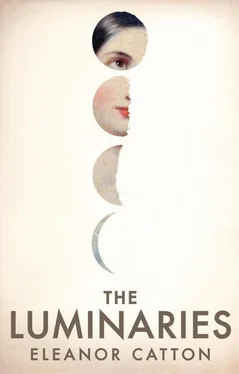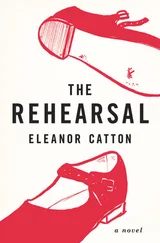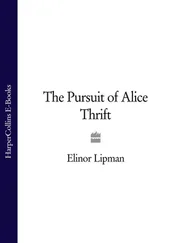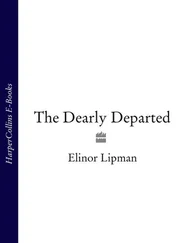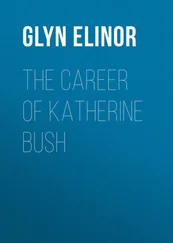Moody returned to the present with a jolt, and saw that Thomas Balfour was still looking at him, with an expression of intrigued expectation upon his face.
‘I beg your pardon,’ Moody said, in confusion. ‘I believe I must have drifted off into my own thoughts—for a moment—’
‘What were you thinking of?’ said Balfour.
What had he been thinking of? Only the cravat, the silver hand, that name, gasped out of the darkness. The scene was like a small world, Moody thought, possessed of its own dimensions. Any amount of ordinary time could pass, when his mind was straying there. There was this large world of rolling time and shifting spaces, and that small, stilled world of horror and unease; they fit inside each other, a sphere within a sphere. How strange, that Balfour had been watching him; that real time had been passing—revolving around him, all the while—
‘I wasn’t thinking of anything in particular,’ he said. ‘I have endured a difficult journey, that is all, and I am very tired.’
Behind him one of the billiard players made a shot: a doubled crack, a velvet plop, a ripple of appreciation from the other players. The clergyman shook out his paper noisily; another man coughed; another struck the dust from his shirtsleeve, and shifted in his chair.
‘I was asking about your quarrel,’ Balfour said.
‘The quarrel—’ Moody began, and then stopped. He suddenly felt too exhausted even to speak.
‘The dispute,’ prompted Balfour. ‘Between you and your father.’
‘I am sorry,’ Moody said. ‘The particulars are delicate.’
‘A matter of money! Do I hit upon it?’
‘Forgive me: you do not.’ Moody ran his hand over his face.
‘Not of money! Then—a matter of love! You are in love … but your father will not approve the girl of your choosing …’
‘No, sir,’ Moody said. ‘I am not in love.’
‘A great shame,’ Balfour said. ‘Well! I conclude: you are already married!’
‘I am unmarried.’
‘You are a young widower, perhaps!’
‘I have never been married, sir.’
Balfour burst out laughing and threw up both his hands, to signal that he considered Moody’s reticence cheerfully exasperating, and quite absurd.
While he was laughing Moody raised himself up on his wrists and swivelled to look over the high back of his armchair at the room behind him. He had the intention of drawing others into their conversation somehow, and perhaps thus diverting the other man from his purpose. But nobody looked up to meet his gaze; they seemed, Moody thought, to be actively avoiding him. This was odd. But his posture was awkward and he was being rude, and so he reluctantly resumed his former position and crossed his legs again.
‘I do not mean to disappoint you,’ he said, when Balfour’s laughter subsided.
‘Disappoint—no!’ Balfour cried. ‘No, no. You will have your secrets!’
‘You mistake me,’ Moody said. ‘My aim is not concealment. The subject is personally distressing to me, that is all.’
‘Oh,’ Balfour said, ‘but it is always so, Mr. Moody, when one is young—to be distressed by one’s own history, you know—wishing to keep it back—and never to share it—I mean, with other men.’
‘That is a wise observation.’
‘Wise! And nothing else?’
‘I do not understand you, Mr. Balfour.’
‘You are determined to thwart my curiosity!’
‘I confess I am a little startled by it.’
‘This is a gold town, sir!’ Balfour said. ‘One must be sure of his fellows—one must trust in his fellows—indeed!’
This was still more odd. For the first time—perhaps because of his growing frustration, which served to focus his attention more squarely upon the scene at hand—Moody felt his interest begin to stir. The strange silence of the room was hardly testament to the kind of fraternity where all was shared and made easy … and moreover, Balfour had offered very little with respect to his own character and reputation in the town, by which intelligence Moody might be made to feel more assured of him ! His gaze slid sideways, to the fat man closest to the hearth, whose closed eyelids were trembling with the effort of pretended sleep, and then to the blond-haired man behind him, who was passing his billiard cue from one hand to the other, but seemed to have lost all interest in the game.
Something was afoot: of this he was suddenly certain. Balfour was performing a role, on behalf of the others: taking his measure, Moody thought. But for what purpose? There was a system behind this battery of questions, a design that was neatly obscured by the excess of Balfour’s manner, his prodigious sympathy and charm. The other men were listening, however casually they turned the pages of their papers, or pretended to doze. With this realisation the room seemed suddenly to clarify, as when a chance scatter of stars resolves into a constellation before the eye. Balfour no longer seemed cheery and effusive, as Moody had first believed him to be; instead he seemed overwrought, strained; even desperate. Moody wondered now whether indulging the man might serve better purpose than denying him.
Walter Moody was much experienced in the art of confidences. He knew that by confessing, one earned the subtle right to become confessor to the other, in his turn. A secret deserves a secret, and a tale deserves a tale; the gentle expectation of a response in kind was a pressure he knew how to apply. He would learn more by appearing to confide in Balfour than by openly suspecting him, simply because if he placed his trust in the other man, freely and without reservation, then Balfour would be obliged to confer his own trust in exchange. There was no reason why he could not relate his family story—however vexing it might be to recall it—in order to purchase the other man’s trust. What had happened aboard the Godspeed , he had no intention of divulging, of course; but in this he did not need to dissimulate, for that was not the story that Thomas Balfour had requested to hear.
Having reflected upon this, Moody changed his tack.
‘I see that I must win your confidence yet,’ he said. ‘I have nothing to hide, sir. I will relate my tale.’
Balfour flung himself back into his armchair with great satisfaction. ‘You call it a tale!’ he said, beaming again. ‘Then I am surprised, Mr. Moody, that it concerns neither love nor money!’
‘Only their absence, I am afraid,’ Moody said.
‘Absence—yes,’ Balfour said, still smiling. He gestured for Moody to continue.
‘I must first acquaint you with the particulars of my family history,’ Moody said, and then lapsed into silence for a moment, his eyes narrowed, his mouth pursed.
The armchair in which he was sitting faced the hearth, and so nearly half of the men in the room were behind him, sitting or standing at their various sham pursuits. In the several seconds’ grace he had secured for himself by appearing to collect his thoughts, Moody let his gaze wander to his left and right, to make note of the listeners sitting closest to them, around the fire.
Nearest the hearth sat the fat man who was feigning sleep. He was by far the most ostentatiously dressed in the room: a massive watch chain, thick as his own fat finger, was slung across his chest, between the pocket of his velvet vest and the breast of his cambric shirt, and affixed to the chain at intervals were knuckle-sized lumps of gold. The man next to him, on Balfour’s other side, was partly obscured by the wing of his armchair, so that all Moody could see of him was the glint of his forehead and the shiny tip of his nose. His coat was made of herringbone, a thick woollen weave that was much too hot for his proximity to the fire, and his perspiration betrayed the posture of apparent ease with which he had arranged himself in the chair. He had no cigar; he was turning a silver cigarette case over and over in his hands. On Moody’s left was another wingback armchair, pulled so close to his own that he could hear the nasal whistle of his neighbour’s breath. This man was dark-haired, slim in build, and so tall that he appeared folded in two, sitting with his knees together and the soles of his shoes planted flat upon the floor. He was reading a newspaper, and in general, he was doing a much better job of pretended indifference than the others, but even so his eyes were somewhat glassy, as if they were not quite focused upon the type, and he had not turned a page in some time.
Читать дальше
